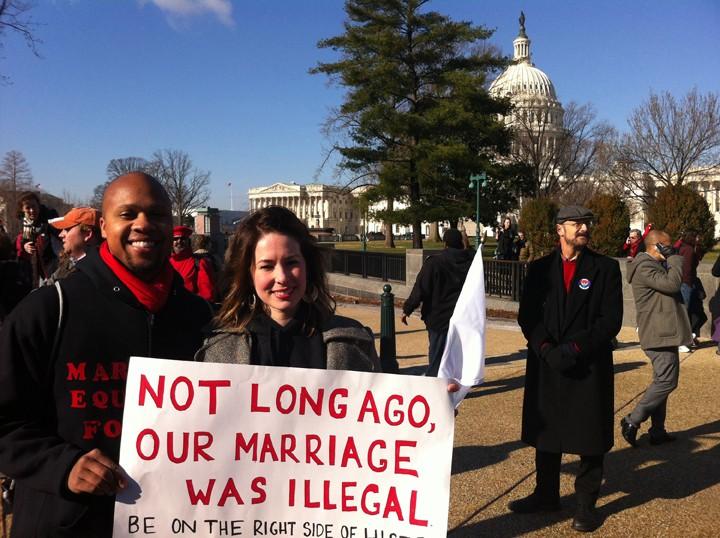WASHINGTON — Supreme Court justices revealed sharp and passionately held differences Tuesday as they confronted California’s ban on gay marriages.
During an 80-minute argument that was unusually long and, at times, markedly heated, the back-and-forth between the court’s conservative and liberal wings foreshadowed difficult decisions to come. Perhaps tellingly, the frequent swing vote, Justice Anthony Kennedy, revealed some ambivalence.
In a positive sign for gay marriage supporters, Kennedy voiced strong sympathy for the approximately 40,000 California children who live with same-sex couples.
“They want their parents to have full recognition and full status,” Kennedy said, with evident feeling, adding that “the voice of those children is important in this case.”
But in a sign of how complicated the outcome might be, Kennedy and Justice Sonia Sotomayor
mused aloud about whether the Supreme Court should have agreed to hear the case called Hollingsworth v. Perry at all. The court has several options, among them issuing a narrow decision or ducking the case altogether.
“The problem with this case is that you’re really asking … for us to go into uncharted waters,” Kennedy cautioned Theodore Olson, a lawyer arguing against the ban.
With hundreds of demonstrators amassed outside and prominent individuals — including Hollywood director Rob Reiner, “Milk” screenwriter Dustin Lance Black and California Lt. Gov. Gavin Newsom — gathered within, the justices were debating whether California’s Proposition 8, which banned same-sex marriage, violated constitutional guarantees of equal protection. Reiner helped found the American Foundation for Equal Rights, which organized opposition to Proposition 8.
Though California Attorney General Kamala Harris, who was also present, noted that “it’s a mistake to make a prediction about a justice’s state of mind based on a question,” some judicial inclinations seem apparent.
There seemed to be little to no support for an Obama administration proposal that would recognize a right to gay marriage in the states that, like California, ban gay marriage but recognize gay civil unions. A sweeping decision covering all 50 states didn’t leap out as an obvious solution, either, with Olson advising justices that they “could write a narrower decision.”
Chief Justice John Roberts Jr., along with fellow conservative justices Samuel Alito and Antonin Scalia, appeared most sympathetic to the arguments of Proposition 8 supporters.
“Traditional marriage has been around for thousands of years,” Alito declared, while “same-sex marriage is very new … so there isn’t a lot of data about its effect. It may turn out to be a good thing; it may turn out not to be a good thing.”
His voice rising, Scalia further pressed Olson to explain “when did it become unconstitutional to prohibit gays from marrying?”
Proposition 8, Olson argued, “walls off gays and lesbians from marriage, the most important relation in life.”
Attorney Charles Cooper, the former Reagan administration official arguing in support of Proposition 8, stressed that recognizing same-sex marriages would “sever [marriage’s] abiding connection with its historic traditional procreative purposes.”
“Marriage itself is the institution that society has always used to regulate these heterosexual, procreative relationships,” Cooper said.
In turn, Justice Elena Kagan countered with the example of older couples who marry despite being past child-rearing age.
“There are lots of people that get married that can’t have children,” Justice Stephen Breyer added.
The justices divided their time between discussing whether Proposition 8 supporters had the “standing” to argue the case, since California officials refused to defend the initiative and the measure’s underlying merits. The standing question might become an off-ramp for the case, short of a big decision. If the court decides that the Proposition 8 supporters lack standing, that kicks the case all the way back to the original decision by U.S. District Judge Vaughn Walker striking down the ballot measure. The legal consequences of that remain uncertain.
“If the issue is letting the states experiment and letting the society have more time to figure out its direction, why is taking a case now the answer?” Sotomayor asked rhetorically.









